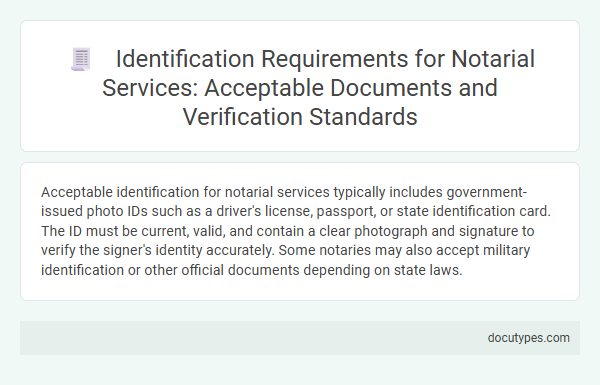Acceptable identification for notarial services typically includes government-issued photo IDs such as a driver's license, passport, or state identification card. The ID must be current, valid, and contain a clear photograph and signature to verify the signer's identity accurately. Some notaries may also accept military identification or other official documents depending on state laws.
Introduction to Notarial Identification Requirements
| Introduction to Notarial Identification Requirements | |
|---|---|
| Purpose of Identification | Confirm the signer's identity to prevent fraud and ensure the authenticity of notarized documents. |
| Accepted Identification Types | Government-issued photo IDs such as passports, driver's licenses, state identification cards, and military IDs. |
| ID Characteristics | Must be current or within expiration limits specified by the notary jurisdiction and contain a clear photograph and signature. |
| Additional Verification Methods | Personal knowledge of the signer by the notary or use of credible witnesses when government-issued ID is unavailable. |
| Jurisdictional Variations | Identification requirements differ by state or country, requiring notaries to follow local laws and regulations precisely. |
| Importance for Legal Validity | Proper identification ensures notarizations are legally binding and accepted by courts, government agencies, and financial institutions. |
Importance of Proper Identification in Notarial Services
What type of identification is required for notarial services? Proper identification is crucial to verify Your identity and prevent fraud. Acceptable forms typically include government-issued photo IDs such as a passport or driver's license.
Commonly Accepted Government-Issued IDs
Notarial services typically require valid government-issued identification to verify the identity of the signer. Commonly accepted forms include passports, driver's licenses, and state-issued identification cards.
These IDs must be current, contain a photograph, and include the holder's signature for authenticity. Such requirements help ensure the notary confirms the signer's identity accurately and prevents fraud.
Alternative Documents for Identity Verification
Notarial services typically require government-issued photo identification such as a passport or driver's license to verify your identity. When standard documents are unavailable, alternative identification like a military ID, state identification card, or a permanent resident card may be accepted. Some states also allow utility bills or bank statements paired with a photo ID for identity verification during notarization.
Expired Documents: Are They Acceptable?
Notarial services require valid identification to verify the signer's identity and prevent fraud. Common acceptable IDs include government-issued driver's licenses, passports, and state ID cards.
Expired identification documents are generally not accepted for notarial acts because they no longer prove current identity or legal status. Some states or jurisdictions may allow limited exceptions, but these are rare and should be confirmed with the specific notary guidelines.
Special Considerations for Foreign Nationals
Notarial services require valid government-issued identification to verify the identity of the signer. Foreign nationals must present identification that is recognized and accepted by the notary jurisdiction.
Special considerations include accepting passports, consular identification cards, or other official documents issued by foreign governments. Some states require the foreign ID to be current and include a photograph and signature. It is important for foreign nationals to check local notary regulations to confirm the types of identification permitted.
Procedures for Verifying Signer Identity
Notarial services require valid government-issued identification to verify the signer's identity. Commonly accepted forms include a driver's license, passport, or state ID card with a photograph. The notary examines the ID for authenticity and ensures that the photograph matches the individual signing the document.
Handling Situations with Insufficient Identification
Notarial services require valid government-issued identification to verify your identity accurately. Common forms include passports, driver's licenses, and state identification cards.
- Primary Identification - A current, government-issued photo ID such as a passport or driver's license is typically required.
- Supplementary Documents - When primary ID is unavailable, notarizers may accept secondary identification like social security cards combined with other proofs.
- Handling Insufficient ID - Notaries may refuse service or request additional verification methods if identification is incomplete or unverifiable.
Clear communication with the notary about your available identification options helps prevent service delays.
Record-Keeping and Documentation Standards
Notarial services require valid government-issued identification to verify the signer's identity accurately. Proper record-keeping and documentation standards are essential to ensure the authenticity and legality of notarized documents.
- Valid Identification - Acceptable forms include passports, driver's licenses, and state-issued ID cards that contain the signer's photograph and signature.
- Recording Details - Notaries must document the type of ID presented, its number, and the date of notarization in a secure journal.
- Retention of Records - Maintaining notarization logs for a legally defined period supports accountability and protects against fraud.
What Type of Identification Is Required for Notarial Services? Infographic

